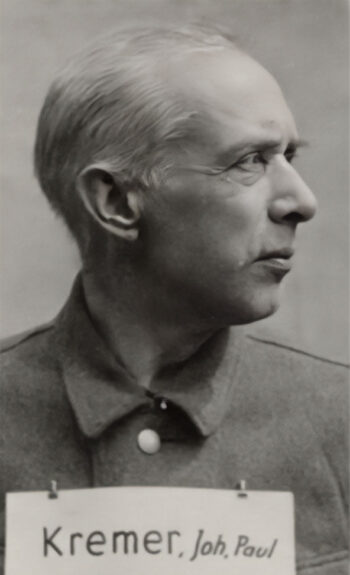Kremer, Johann Paul

Johann Paul Kremer (26 Dec. 1883 – 8 Jan. 1965), professor of medicine at the University of Münster, West Germany, substituted for a convalescing camp physician at the Auschwitz-Birkenau Camp from 30 August to 18 November 1942. During that time, he added numerous entries to his diary. He also wrote a letter on 21 October 1942, in which he wrote:
“Though I have no definite information yet, nonetheless I expect that I can be in Münster again before December 1 and so finally will have turned my back on this Auschwitz hell, where in addition to typhus, etc., typhoid fever is now mightily making itself felt.”
His diary contains several entries displaying his opposition to the civil-rights violations going on in Germany, mocking the Third Reich’s theory of a “German Science” and comparing censorship in Germany to the Holy Inquisition of Galileo’s time. Yet in spite of this opposition, his diary does not contain a single entry about any kind of mass murder going on at Auschwitz. The only reference to gassing refers to fumigating “a block with Zyklon B against the lice.”
Assuming that the Third-Reich authorities would have allowed a non-initiated, independent-minded professor to experience the darkest secret of the nation for two months, then let him go back to his civilian life as if nothing had happened, is simply preposterous. It is similarly preposterous to assume that this professor did nothing to somehow convey his knowledge of this terrible secret to anyone.
He only “confessed” and confirmed all the orthodox accusations of mass murder when he faced charges at a Polish Stalinist kangaroo court in 1947 in Krakow. During that judicial charade, truth was no defense, or rather “truth” had been cast in stone by political powers hell-bent at paining the defeated Third Reich in the worst light possible, in order to justify the various Allied crimes committed against humanity, including against Germans. Among these crimes looms large the greatest ethnic cleansing in the history of mankind then wrapping up: the mass murder and expulsion of some 12 million Germans from Eastern Europe and East Germany, in which Poland was the primary culprit.
Western mainstream historians contributed to this distortion of history by mistranslating Kremer’s diary entries. For example, in the context of the terrible death toll caused by the typhus epidemic raging during those months at Auschwitz, Kremer, quoting his physician colleague Heinz Thilo, called the camp the “anus mundi” and a veritable “camp of annihilation”, which the Auschwitz Museum twisted into “extermination camp” while omitting the context of the epidemic. Kremer repeatedly mentions “special operations from Holland,” which clearly referred to the arrival and admission of deportees coming from Holland, but historians mistranslated that as a “special operation with a draft from Holland” or as a “special operation on people coming from Holland,” thus hiding from the reader the fact that the deportation of Jews from Holland itself was the special operation, not what was supposedly done with or on them at Auschwitz.
There are many more entries in Kremer’s Diary where words such as “special” are used, none of which mean anything ominous, if seen in the proper historical and documentary context, but all of which are distorted by the mainstream to support their cause of trying to demonstrate mass homicide.
Like so many of his co-defendants, Kremer was sentenced to death in Krakow, but had the luck of getting pardoned and released early after having served a little over ten years. Scarcely had he returned home, when the West-German authorities put him right back on the next show trial, with truth once more being no defense. Kremer had learned his lessons well, and meekly confirmed once more the unchallengeable orthodox narrative. He was sentenced to ten years, yet walked away as a free man, counting the time served in Poland. Again standing in court a few years later, this time as a witness during the Auschwitz Show Trial at Frankfurt, he wisely abstained from rocking the boat, and once more submissively repeated all the lies which, by that time, he actually might have believed himself. He died shortly afterwards.
(For details, see Mattogno 2016d, pp. 82-95; Rudolf 2023, pp. 451-453; Faurisson 1980, pp. 55f.; 1981.)

You need to be a registered user, logged into your account, and your comment must comply with our Acceptable Use Policy, for your comment to get published. (Click here to log in or register.)